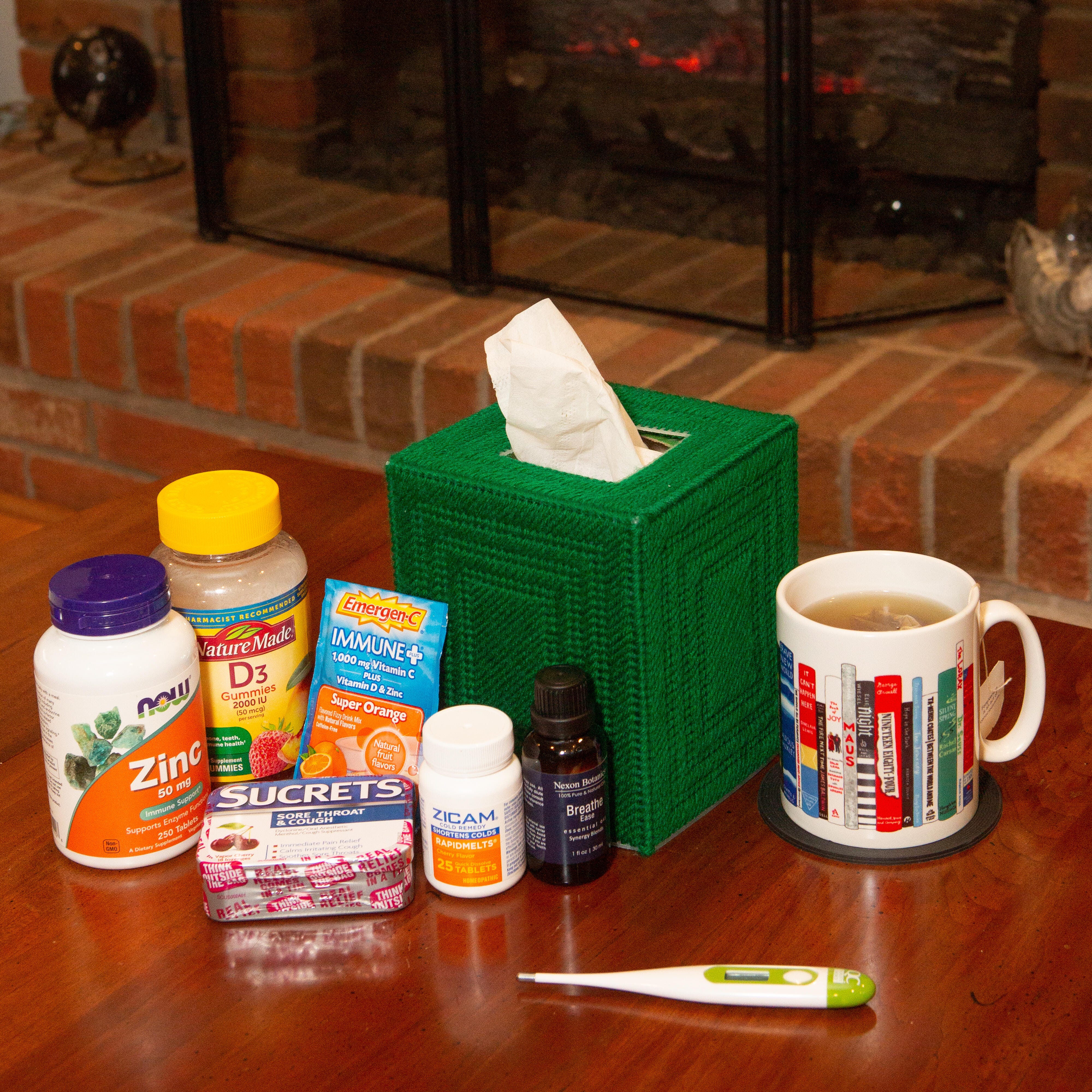COVID, the flu or a common cold? Here's how to tell the difference - CNET

Symptoms for the flu and COVID-19 can look similar -- here's what you need to know.
Sarah Tew/CNETIf a cough, congestion, sneezing fits or scratchy throat weren't enough, trying to figure out whether you're sick with COVID-19, a flu virus or a common cold is tricky when so many of the symptoms overlap. While you never want to spread germs to your loved ones, the serious implications of COVID-19 make it more important than ever to keep your friends and family from infection -- especially if you're around people in high-risk categories, like older adults, people with underlying health conditions and those with compromised immune systems.
Vaccines are available to protect against the flu and COVID-19 (and yes, you can get both shots simultaneously). But even if you are fully vaccinated against COVID-19, breakthrough cases can and do happen. While typically these infections are less likely to cause hospitalization and death, you could still become sick and contagious.
As we head into flu season (which could be different this year), now's a good time to understand the differences between each illness. We spoke with medical experts to find out the best ways to protect yourself and your loved ones. Plus, here's what you need to know about getting the flu shot if you're vaccinated against COVID-19. And here's everything to know about mixing COVID-19 booster shots, the latest on COVID-19 vaccines for kids and the antiviral COVID pill that's in the works.
What are common flu and COVID-19 symptoms?
Many respiratory illnesses start with similar symptoms, so it's hard to determine which you may have right away.
It may not be easy to immediately figure out whether you're sick with the flu or COVID-19, but here are some symptoms the two share.
- Cough
- Fever
- Difficulty breathing or shortness of breath
- Sore throat
- Runny nose or congestion
- Headache
- Body aches
If you feel sick with any of these symptoms, it's best to isolate yourself right away. You can spread the flu and COVID-19 one day after being infected. But keep in mind that these symptoms may be signs of other viruses, such as the rhinovirus -- which causes the common cold -- and RSV. Call your primary care provider for questions and the best next steps. And consider getting tested.
Remember that COVID-19 isn't just a respiratory illness and can also affect a wide range of systems in the body. The range of the coronavirus' damage is still in the process of being fully understood.
What are the differences between flu and COVID-19 symptoms?
The most significant difference is that it usually takes longer for COVID-19 symptoms to show up: two to 14 days for COVID-19 versus one to four days for the flu.
Symptoms of the flu, also known as influenza, and COVID-19 can both lead to hospitalization and death.
Dr. David Hamer, a Boston University School of Public Health professor and physician at Boston Medical Center, agreed that the symptoms aren't easy to differentiate right away. But the biggest COVID-19 sign that isn't found in influenza is the loss of taste or smell.
"Clinically, it's going to be harder for an individual to differentiate. COVID is a little more likely to progress to a severe disease but certainly, influenza can kill," Hamer said.
Can I be infected with the flu and COVID-19 simultaneously?
To pile on the misery, you can be infected with the flu and COVID-19 at the same time. And symptoms for each viral infection may look similar. Hamer added that someone with COVID really may struggle with flu symptoms.
"It has been reported, but it turns out that we don't have a lot of experience with coinfection because last year when we had a really big surge of COVID, it was the lightest flu season on record," said Dr. Daniel Solomon, an infectious disease doctor at Brigham and Women's Hospital. Coinfection experience and research stem from the early days of the pandemic, so it's hard to tell how prevalent this "twindemic" could be this year as flu season begins.
Someone infected with both the flu and COVID-19 may have a more severe illness and complications that may lead to hospitalization. Supportive care can treat COVID-19 symptoms and antiviral drugs can be used to treat the flu. An antiviral treatment like remdesevir is harder to get for COVID-19, and an antiviral pill has not yet been authorized.

A take-home COVID-19 test is one way to start determining which infection you might have.
Stephen Shankland/CNETWhat are 'long COVID' and 'long flu'?
Some people experience longer-term COVID-19 and flu symptoms, commonly known as "long COVID" or "long flu." Long COVID can include shortness of breath, headaches, chest pains, fatigue and other COVID-19 symptoms that linger for weeks or months. Long flu symptoms can consist of a prolonged cough, sore throat, body aches and other symptoms lasting longer than five to seven days.
A PLOS Medicine survey found that long COVID is more likely than long flu. Those that had a severe case of COVID-19 or were hospitalized due to the virus were more likely to experience symptoms longer, but most resolved within the first six months.
How do you know if you have a common cold or COVID-19?
The symptoms of the common cold are also similar to COVID-19 and the flu.
Like COVID-19, you may notice symptoms such as cough, sore throat and a runny nose. But common colds usually also come with sneezing, watery eyes and post-nasal drip. However, it may be harder for doctors to diagnose right away if you have other symptoms on top of signs of a common cold.
"If someone comes in with a fever and a headache, it's going to be hard for us to know if it's flu or if it's COVID. That's why a lot of health care systems are moving towards testing for both flu and COVID at the same time," Dr. Ala Dababneh, an infectious disease doctor with Mayo Clinic, said. Doctors may also test for RSV.
Usually, common colds resolve on their own and don't lead to further health complications and often can be treated with over-the-counter medication.
Here's a list of COVID-19 symptoms that are different from common colds:
- Loss of taste or smell
- Difficulty breathing or shortness of breath
- Fever
- Body aches
- Chest pains
- New confusion
What is the difference between COVID-19, the flu and other illnesses?
Solomon, the infectious disease physician, pointed out that no common symptom can help determine what's wrong right away. The best way to tell is to contact your doctor to test for both the flu and COVID-19. The table below shows the differences and symptom overlap between the illnesses and their symptoms.
Different symptoms and illnesses to watch out for
| | COVID-19 | Flu | Common cold | Allergies |
|---|---|---|---|---|
| Cough | ✓ | ✓ | ✓ | |
| Sneeze | | | ✓ | ✓ |
| Fever | ✓ | ✓ | | |
| Fatigue | ✓ | ✓ | | |
| Body aches | ✓ | ✓ | | |
| Runny nose or congestion | ✓ | ✓ | ✓ | ✓ |
| Sore throat | ✓ | ✓ | ✓ | |
| Headache | ✓ | ✓ | | ✓ |
| Loss of taste or smell | ✓ | | | |
| Difficulty breathing | ✓ | ✓ | | |
"If there's fever, body aches or chills that would make me more concerned about other respiratory illnesses -- like the flu or COVID," Solomon said. Since the COVID-19 vaccine helps prevent severe symptoms, more common signs of a cold can still be COVID, he added.
Because of this, Solomon has guided his patients and family members to pay close attention to their usual allergy symptoms and get a diagnostic test if they notice anything less common.
What is the best way to protect yourself and others from COVID-19 and the flu?
The best way to protect yourself from the flu and COVID-19 is to get vaccinated against both viruses. Even though no vaccine is 100% effective, vaccinations can help guard against the virus and prevent severe illness and hospitalization.
People who are pregnant and older adults should get vaccinated as soon as possible because COVID-19 and influenza can lead to hospitalization and death, said Hamer, the Boston University professor. He also predicts more COVID-19 booster shots will be given in the coming months to reduce transmission of COVID-19 over the winter.
Experts suggest that your local COVID-19 transmission level should guide your plans for the holiday season. He highly recommends outdoor gatherings and getting all guests vaccinated.
And people should consider antigen testing as another level of protection, especially if you're planning a gathering -- whether they're showing symptoms or not.
If you're ever unsure about your symptoms or illness, it's best to get tested. Remember to follow other well-known hygiene tips, like washing your hands often, disinfecting frequently touched surfaces and staying home if you're not feeling well.
What are other common illnesses similar to COVID-19 and the flu?
If you have a cough, sore throat or other respiratory illness symptoms, it may not be COVID-19, the flu or a cold. There are other common illnesses with similar symptoms.
- Sinus infections
- Strep throat
- Bronchiolitis
- Asthma
If you tested negative for COVID-19 and the flu, it's best to consult with your primary care provider. Some doctors will conduct a respiratory pathogens panel to determine what virus or bacteria is causing you to feel sick.
Here are the flu shot side effects to know about this year and the latest on the COVID pill. And here's the latest on the COVID-19 vaccine mandates for employers with over 100 employees, federal employees and other groups.
CNET contributor Mercy Livingston contributed to this article.
The information contained in this article is for educational and informational purposes only and is not intended as health or medical advice. Always consult a physician or other qualified health provider regarding any questions you may have about a medical condition or health objectives.
Comments
Post a Comment